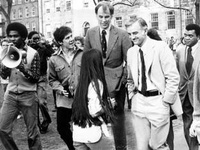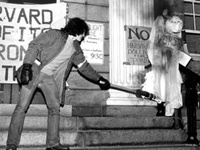“We had an impact on campus and off,” says Ruskin. “The idea that people cared about what we had to say was astounding to me.”
But perhaps the greatest legacy left by the South African divestment movement was one of anti-divestment sentiment within a frustrated and fatigued administration.
While schools such as Ohio State University, the University of Wisconsin and Hampshire College voted to divest themselves of stock in all corporations operating in South Africa, Harvard stuck firmly by its reluctance to use divestment to make political statements.
In a 1979 open letter to the Harvard Community, Bok said that divestiture is unjustifiable because it is “legally questionable, widely disputed on its merits, and very likely to prove ineffective in achieving its objectives,” solidifying Harvard’s stance not only on the South Africa question but on divestment in general.
Last spring, after 64 Harvard professors signed a petition calling for the University to withdraw from its investments in Israel—estimated at more than $600 million—University President Lawrence H. Summers said Harvard did not intend to divest from the beleaguered state.
Summers later said such petitions calling for divestment because of Israel’s actions in the Israeli-Palestinian conflict “are anti-Semitic in their effect if not their intent.”
Earlier this year, administrators also opposed the suggestion of divesting from arms manufacturers involved in the war with Iraq.
While both of these proposals garnered some attention, neither of them proved to be as divisive as the 1978 divestment movement, which incited an entire campus and called the nation’s attention to the issue of divestment in apartheid South Africa.
—Staff writer Jaquelyn M. Scharnick can be reached at scharnic@fas.harvard.edu.










